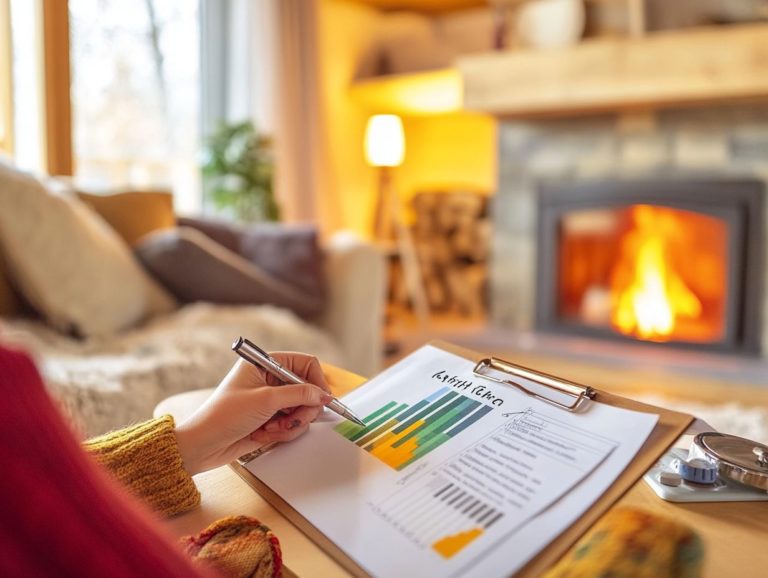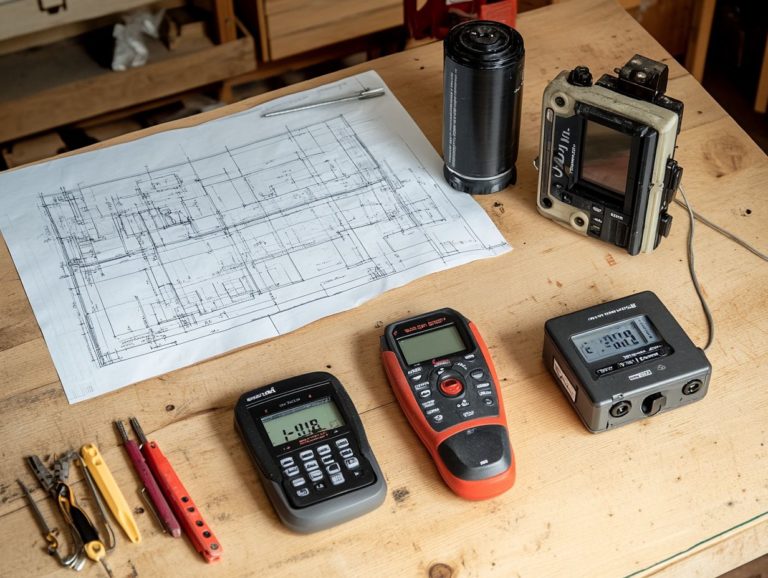How to Choose the Right Energy Auditor
Navigating the world of energy efficiency can feel overwhelming, especially when it comes to choosing the right energy auditor!
These professionals are essential in pinpointing opportunities for you to save energy and cut costs. Get ready to dive into energy auditing and discover how you can save big on your bills!
You ll uncover insights into potential costs and learn how to select the auditor that best fits your unique needs. Prepare to empower yourself with knowledge that could lead to significant savings on your energy bills!
Contents
- Key Takeaways:
- What is an Energy Auditor?
- Why Hire an Energy Auditor?
- Qualifications to Look for in an Energy Auditor
- Questions to Ask Potential Energy Auditors
- Costs and Contracts
- Choosing the Right Energy Auditor for Your Needs
- Common Energy Problems in Residential Buildings
- Final Thoughts on Energy Auditing
- Frequently Asked Questions
- What is an energy auditor?
- Why is it important to choose the right energy auditor?
- How do I know if an energy auditor is qualified and reputable?
- What should I look for when comparing energy auditors?
- Do energy auditors specialize in certain types of buildings?
- How much does an energy audit typically cost?
Key Takeaways:

An energy auditor evaluates how energy is used in buildings and offers tips for making them more efficient.
Hiring one can lower your bills, improve comfort, and help you take advantage of utility rebates.
When selecting an auditor, check their qualifications, experience, and ask questions to ensure they meet your needs.
What is an Energy Auditor?
An energy auditor helps homeowners improve energy use in their homes. They look at how energy is used and find ways to save.
By conducting thorough home energy audits, they offer a detailed analysis of your current energy performance, identifying issues with insulation, heating, ventilation, and air conditioning systems, and overall building functionality.
Their expertise enables you to uncover energy-related problems that contribute to excessive consumption and high energy bills.
Why Hire an Energy Auditor?
Engaging an energy auditor is essential for homeowners like you who are eager to enhance energy efficiency, lower energy bills, and capitalize on rebates and incentives offered by utility companies.
A comprehensive home energy audit helps you implement tailored energy solutions that not only improve your home s efficiency but also maximize your financial benefits.
Qualifications to Look for in an Energy Auditor
When selecting an energy auditor, consider their qualifications carefully. Look for credentials such as BPI certification, a relevant educational background, and significant experience in the field. Additionally, you may want to review how to prepare for a commercial energy audit to ensure you’re making an informed decision.
Each of these factors plays a crucial role in determining the quality and reliability of the energy audit services you will receive.
Education and Certifications
An energy auditor should ideally hold a degree in fields related to energy management and efficiency, complemented by BPI certification, which confirms their expertise in energy auditing techniques.
A degree in environmental science, engineering, or a related area provides a solid foundation to navigate the complexities of energy systems.
Pursuing additional certifications, such as those offered by the Association of Energy Engineers (AEE) or the National Association of Energy Auditors and Professionals (NAEAP), can further elevate skills and boost marketability.
The BPI certification specifically evaluates the ability to apply diagnostic techniques for assessing energy efficiency in buildings. By securing this credential, an auditor demonstrates adherence to industry standards, significantly enhancing credibility with clients and stakeholders who seek trustworthy energy assessments.
Questions to Ask Potential Energy Auditors

When you re interviewing potential energy auditors, asking the right questions is crucial for assessing their expertise and ensuring they can truly meet your energy efficiency needs.
Inquire about their audit process, the tools they utilize, and their familiarity with various energy solutions to gain a comprehensive understanding of their capabilities.
Key Inquiries for Evaluating Expertise
When evaluating the expertise of an energy auditor, key inquiries should include the specific tools they utilize, such as a camera that detects heat and tests that check how much air leaks from your home. Additionally, their approach to conducting a thorough home energy audit is important.
Beyond the tools at their disposal, it s crucial to ask about the methodologies they employ during the assessment process. Ensure they adhere to industry best practices. Consider their experience with various property types, as this can significantly influence the energy efficiency recommendations they provide.
After the audit, discuss the availability of additional services, such as post-audit follow-ups or assistance with implementing suggested improvements. This can provide valuable insight into the auditor’s commitment to ongoing support and the overall effectiveness of their evaluations in achieving optimal energy savings.
Costs and Contracts
Grasping the costs and contracts tied to hiring an energy auditor is essential for homeowners. Pricing can fluctuate considerably depending on the intricacies of the home energy audit and the specific services provided by the energy audit firm.
Navigate these factors thoughtfully to ensure you receive the best value for your investment.
Understanding Pricing and Agreements
When you re reviewing pricing and agreements for energy audit services, grasp the scope of work outlined in the contract. Be aware of any potential additional fees that may arise during the audit process.
This means meticulously examining each clause to pinpoint the specific services covered. Ascertain whether the pricing accurately reflects the complete cost of the audit.
Pay close attention to cancellation policies; these can significantly affect your ability to opt out without incurring penalties. Explore warranty provisions that may guarantee the performance of the recommended energy-saving measures.
Being aware of hidden costs such as fees for supplementary assessments or travel expenses can help you avoid unwelcome surprises down the line.
Understanding these elements enables you to make informed decisions and ensures that the energy audit aligns seamlessly with your financial and environmental goals.
Choosing the Right Energy Auditor for Your Needs
When selecting the ideal energy auditor for your needs, consider several key factors.
Their experience with residential buildings is crucial. This ensures they understand the unique challenges you might face.
Their familiarity with local utility companies can greatly enhance the effectiveness of their recommendations.
Most importantly, look for someone who can offer tailored energy solutions that align seamlessly with your specific energy consumption goals.
Make this careful choice now for better energy savings!
Factors to Consider in Making a Decision

When you’re deciding which energy auditor to hire, consider factors like their understanding of current energy usage trends, the technologies they utilize, and their history of delivering successful audits. You might also want to learn how to make energy audits work for you to ensure you get the best results.
Equally important is the array of certifications the auditor holds; these credentials can be a strong indicator of their expertise and commitment to industry standards.
Ask about the specific instruments used in the audits, such as thermal imaging cameras and blower doors, which can provide crucial insights into your home’s energy efficiency.
Research the overall reputation of the auditor through client testimonials and industry reviews. This can prove invaluable in assessing their reliability.
A well-rounded approach to these considerations will not only boost your home’s energy efficiency but also ensure that you make a sound investment for long-term savings.
Common Energy Problems in Residential Buildings
Common energy problems in residential buildings can greatly affect energy efficiency. Issues such as air leakage, malfunctioning HVAC systems, and insufficient insulation can pose challenges.
This underscores the importance of energy audits, which are essential for pinpointing and addressing these critical issues.
Final Thoughts on Energy Auditing
An energy audit can make your home more efficient and comfortable. It may also unlock rebates from utility companies eager to support sustainable energy.
By taking this step, you can find out where energy is wasted. This leads to targeted improvements that will help cut your utility bills.
As more people strive to lower their carbon footprint, an energy audit is a smart investment. The insights you gain will help you make informed decisions for a greener, cost-effective home.
Frequently Asked Questions
What is an energy auditor?
An energy auditor is a professional who checks how energy is used in a building. They find ways to save energy and suggest improvements.
Why is it important to choose the right energy auditor?

Choosing the right energy auditor matters. Their recommendations can significantly boost your building’s energy efficiency, and knowing how to find local energy auditors can help you make an informed choice that ultimately saves you money.
How do I know if an energy auditor is qualified and reputable?
Check for certifications from trusted organizations like the Association of Energy Engineers. Ask for references and look for online reviews to assess their reputation.
What should I look for when comparing energy auditors?
Consider their certifications, experience, and customer feedback. Ensure they use modern equipment and provide detailed reports with clear recommendations.
Do energy auditors specialize in certain types of buildings?
Yes, they may focus on residential, commercial, or industrial buildings. It’s best to choose an auditor familiar with your building type for tailored advice.
How much does an energy audit typically cost?
The cost varies based on the building’s size and complexity. Generally, a commercial audit ranges from $0.10 to $0.40 per square foot, while a residential audit costs between $100 and $500.






